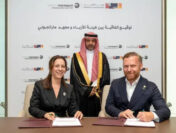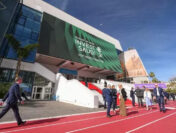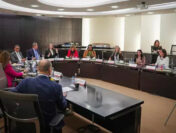The World Majlis, Earth 2.0 | Reengineering Planet Earth, presented in collaboration with the Maldives as part of Climate & Biodiversity Week at Expo 2020 Dubai, has been highlighting the strong sense of urgency to achieve the global sustainability objectives. Panellists shared insights on the importance of innovation and collaboration to deliver solutions that support these goals. The discussion sought to address the role of technology and engineering in a warming world, the risks associated with such efforts, and how to balance the interests of different stakeholders equitably.
His Excellency Mohamed Nasheed Former President of the Maldives and Speaker of the People’s Majlis, said: “One of the most important things is not to lose hope. There is a bit of gloom… we seem to feel that it is uncontrolled, but if we go with the pessimistic picture, it will be difficult for us to find solutions. I believe in human ingenuity and I think we do have solutions. The idea is to see if we can use nature as infrastructure. The reef protects our shorelines to start with, it reduces wave energy and so stops coastal erosion. Its biodiversity contains our livelihood [with fishing] and people coming to see it is also part of our livelihood – and it is all challenged because of global warming. The argument is to see how we can help nature grow faster.”
“Because of the erosion, we are having to build water breakers and embankments to protect our shoreline… but it costs USD 5,000 to protect one metre of the coastline, so it’s simply not feasible. Meanwhile, growing a reef, costs USD 20 a metre… It takes longer, and that’s why we have to get the science involved more rapidly. It’s very important that we find these solutions now… on how we can get the coral to grow faster, and how we may be able to restore. If we focus on the good news, we will be in a far better place than if we focus on the pessimistic stories.”
During the forum, His Excellency Dr Abdulla Al Mandous, Director General of National Centre of Meteorology, UAE, spoke about the pioneering role the UAE played in cloud seeding – a prime example of technology that works for the benefit of the environment. His Excellency Dr Abdulla said: “The UAE has harsh weather and high evaporation… with weather modification, you can reengineer any of the weather elements… We do it for rain enhancement.” Her Excellency Dr Nawal, Permanent Representative of the UAE to the International Renewable Energy Agency (IRENA), discussing the growth of the rain enhancement programme, added: “To be able to advance such a niche research and expand the use of it, and make it so attractive to so many universities… it is incredible.”
Explaining that the UAE is not an oil exporter, but an energy exporter, Her Excellency Dr Nawal Al Hosany said: “Our leadership has just announced a strategic initiative toward net zero… based on milestones and clear initiatives that aim to get us to that target, which is part of our global responsibility, while also providing opportunities for economic growth and job opportunities. These came out of a government accelerator, looking at what it means to be net zero.
“The UAE had a strong and leadership position in oil and gas, and we want to maintain it in renewables as well… and we have contributed to this around the world. When His Highness Sheikh Mohammed bin Zayed said that we will celebrate when we ship our last barrel of oil… it is because we will be ready… we are a responsible nation and our responsibility is to provide energy to the world.”
Her Excellency Inês dos Santos Costa, Secretary of State for the Environment, Portugal said: “If we think of technology as being the hardware of the system that we want to engineer, it’s not going to be enough… with the ‘software’ [we have]. We need to start changing our discourse… Firstly, we must recognise that the supply and demand curve doesn’t happen in a vacuum…. If the economy is not observant of those limits, it will fail. Secondly, we need to find a different meaning for the word growth. We want it to be in health, in wellbeing, in regeneration, education… we need to shift how we see economic development with new objectives, and that should be present when we think about new technologies. And finally, in order to reach our commitments… the IPCC states that we won’t get there, until we revise the way we extract, produce and consume. We are looking at technology as a saviour… without changing the status quo.”
Professor Joaquin Ruiz, Vice President of Global Environmental Futures; Thomas R. Brown Chair and Director of Biosphere 2; Professor of Geosciences, The University of Arizona, USA said: “We’ve engineered a world without thinking of the consequences of how we’ve engineered it…we all must remember the difference between science and engineering… we must speak to other disciplines deeply, because many of the engineering solutions we come up with have huge ethical and political consequences.”
Professor Ruiz also put forward the successful concept of growing food underneath solar panels – “harvesting the sun twice” – which has been found to provide energy security, water security and food security. He explained that doing so creates microclimates and allows potentially for up to three crop seasons per year (instead of two). The electricity generated can be used to clean up or pump water, and the shade of the solar panels means humidity remains in the soil longer, meaning less water is needed.
Professor Paolo Gali, Founder and Director of the Marine Research and High Education Center (MaRHE) and Full Professor of Ecology, Department of Environmental Sciences, University of Milano-Bicocca, Italy, said: “We have to speak with different people… merge different skills. Biologists have to speak with doctors, with veterinarians, with engineers… and sometimes you have to think in a crossword manner – horizontally, vertically, and with depth. We have to share, and think in an ‘open source’ way. As a researcher, we have to give the best data and best solutions for the politicians. We have to give them the opportunity to do their best, by giving them the best data. If we do so, we can do the best thing for humanity: move very fast.”




